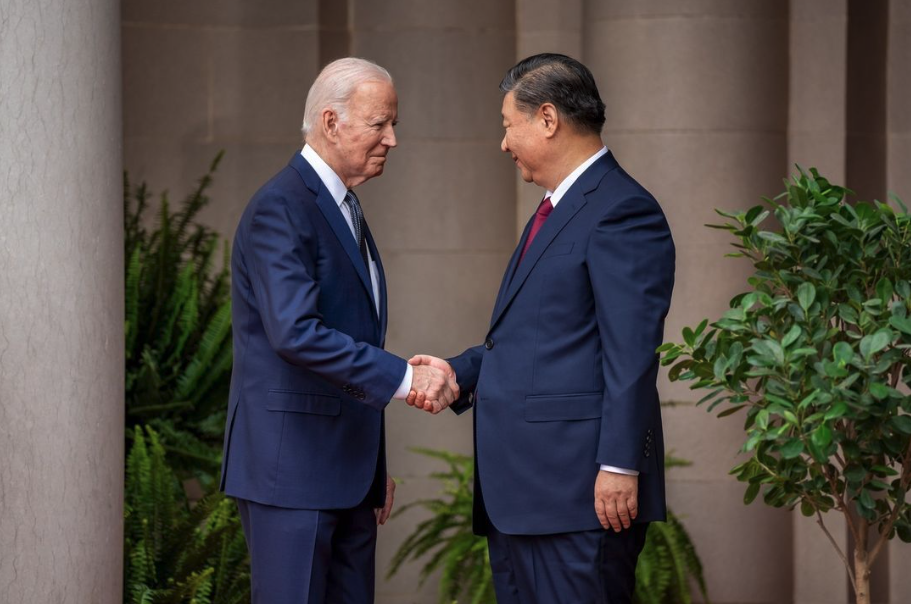President Joe Biden met with his Chinese counterpart Xi Jinping this week for the first time face-to-face in a year.
Biden said the meetings were “some of the most constructive and productive discussions we’ve had,” adding that the two leaders agreed to keep lines of communications open.
Many have been surprised by the apparent turnaround in China’s messaging to the U.S. – far more cooperative and friendly than many China watchers had anticipated. And the U-turn may have to do with China’s economy.
Sewon Hur, a research economist with the Dallas Federal Reserve, has co-authored new research projecting that China’s pace of growth is likely to slow. He joined the Standard to share more.
This transcript has been lightly edited for clarity.
Texas Standard: I think a lot of people have been noting that Chinese economic figures have started to look a little different in recent months – and in fact, years. And it appears that China’s economy has been slowing down. That’s not exactly new. But this new research that you’ve done here seems to point to how this slowdown could be part of a broader transition. Could you say more?
Sewon Hur: You know, China, since it joined the WTO in 2001, has enjoyed phenomenal growth over the last two decades. And we’ve kind of become accustomed to China growing very rapidly and providing a source of growth for the U.S. and for the global economy as a whole.
And China has made a lot of progress in terms of moving up from what used to be a low-income country to now a middle-income country. And many countries over the last half century or so have made this transition from a low-income to a middle-income country. But not many countries have been able to make the next step. And that’s where China kind of lies at the moment.
Are they willing to do continued reforms to improve institutions so that the country is more conducive to economic growth? And depending on whether they’re willing to undertake these reforms, they’re really able to set the stage for what the growth prospects are going for. But one thing is clear: We’re no longer, for the next decade or two, going to be able to rely on China growing at the fast pace that it did over the last two or three decades.
What do you think the significance of that is for the United States? I mean, as we’ve seen with this change in tone. What do you make of the headlines that you’ve been hearing from the APEC summit, for example, in light of the research you’ve been doing?
So yeah, we do project China to slow down considerably over the next two decades. And recent events, starting from troubles with the real estate sector and the slowdown of the economy this year in particular, I think has maybe made the leadership in China realize that, you know, they’re not going to be able to dictate the terms of the global economy in a way that they otherwise had been anticipating.
And so I think that does contribute to maybe changing their tone. And they want to work with the United States in kind of shaping the global economy going forward. So I think that’s definitely related.
» GET MORE NEWS FROM AROUND THE STATE: Sign up for our weekly ‘Talk of Texas’ newsletter
For a country that’s trying to make that next step to a high-income country – moving from middle to high – to face economic headwinds domestically, you point to China’s one-child policy being partly to blame for what’s happening there. Can you say a little bit more about that?
That’s correct. So China has had this one-child policy that started decades ago, but that’s now contributed to a shrinking, kind of a changing the demographic composition of the country’s population so that the share of the population that’s of working age – between 15 and 64 – that’s been shrinking over time, and it’s projected to continue to shrink over time. And when that happens, it’s very difficult for the country to continue growing.
And yet China’s growth, you write, “should continue to outpace the U.S. and many other advanced economies.” I wonder, though, if this economic slowdown is having any impact on that broader narrative of China eventually surpassing the United States as a kind of global superpower? Has that narrative, in fact, changed at all?
I think that narrative has maybe kind of changed too far to the other side. I mean, when you look at income per capita, it’s roughly about 20% of that in the U.S. So, you know, they’re very far from kind of catching up in terms of income per capita. And I don’t know if they ever will.
We’re projecting that China’s growth will slow. We’re not projecting that China will, you know, have negative growth over the next 10 years or so. So unless something really bad happens to their economic outlook, I think eventually when measured in terms of just the sum of goods and services produced, when you look at gross domestic product in the aggregate, just because China is so large, I think it’s inevitable that that’s going to take place.
Let me ask the question in a slightly different way. I’m getting a sense that because of economic conditions in China that Xi Jinping is now sort of warming to the idea that this rivalry should now shift to a greater emphasis on partnership. Is that off base?
You know, I think a lot of people hope that’s the case. I certainly do. Some countries that have made this leap from from low income to middle income, they may have done that under a democratic kind of regime or a more kind of top-down regime.
But eventually the countries that kind of made the transition from middle to high income, a lot of them – you look at Korea and other countries – that has been the case, that any countries that have kind of made that leap from a middle to high income have also done so with democratic institutions.















